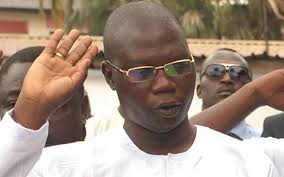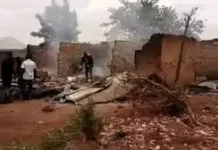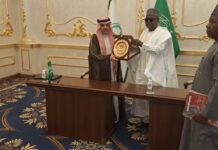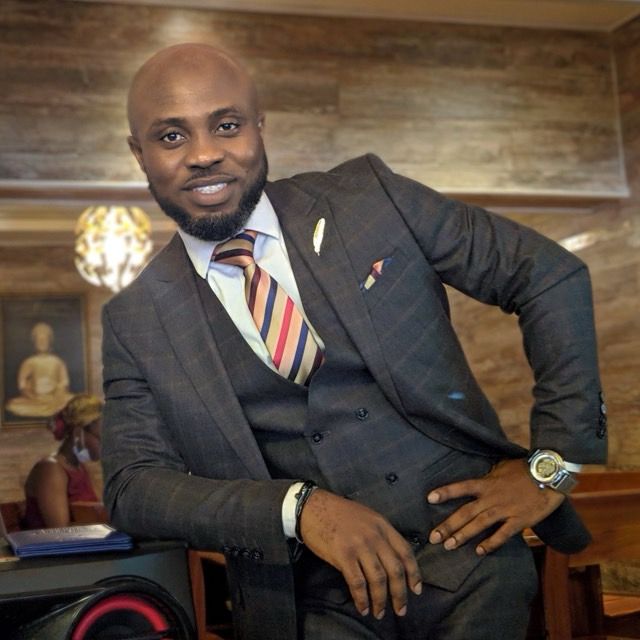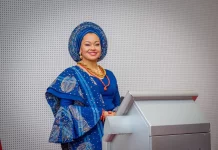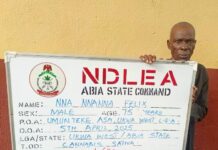National Coordinator of the Oodua People’s Congress (OPC), Gani Adams, in this interview with Assistant Editor (South West), MUYIWA OLALEYE, speaks on the last election and how he would support president-elect, Muhammadu Buhari, among other salient issues.
During the last presidential election, you supported President Goodluck Jonathan; yet he did not achieve much in the South West. Why was it so?

The people of the South West, especially the entire Yoruba race, tried their best to ensure President Goodluck Jonathan emerged. Unfortunately, the poor distribution of Permanent Voters Cards (PVCs) worked against the plan. You will realise that in a state such as Zamfara, the All Progressives Congress (APC) got 900,000 votes. With the Peoples Democratic Party (PDP) votes added, that state had over one million votes. In Katsina, it was about 1.4 million votes. In Kano, APC votes, together with PDP votes, were about 2.4 million, far more than the total number of votes generated in Lagos. The total number of registered voters in Lagos was about six million, while the registered voters in Kano were four million. That was what we said during our peaceful protest and they (politicians) twisted it as if it was a violent protest. It was not.
I think it is a lesson for us in the future. We should not, because something is not in our interest, try to twist a position of an organisation that wants sanity in the society, especially in our electoral process.
Your fears were that if Jonathan was not re-elected, the recommendations at the national confab would die a natural death. With Muhammadu Buhari now as president-elect, what is your advice to him?
I think the major cardinal point of the campaign of Buhari was change. And one of the reasons Nigerians voted for him was because they wanted change. The slogan ‘change’ came from President Barack Obama, during his first term while he was campaigning for votes. He let the Americans realise that they needed fresh blood in politics.
Therefore, for the president-elect to achieve proper change in Nigeria, the country needs to be restructured. If there is no change in structure, if there is no true federalism in Nigeria, it will be very difficult to achieve transparency.
I have listened to the comments of the president-elect, and with the statement he made as part of his promises to Nigerians, that those who would work with him, including the governors, ministers, special advisers and the permanent secretaries, must declare their assets in the court of law, I think these are the ingredients of transparency and accountability.
Second, he also said that the pensions paid to former governors would be reviewed, which is a welcome idea too. But if he does not include the recommendations of the national conference in his programmes, I think there is no way he can have a total change because it is very important that this country be restructured. If Nigeria is not restructured, definitely we may not witness peace and tranquility. Nigeria has many nations within a nation. We need to review our existence, and we need to review the corporate existence of this country; not by breaking up Nigeria, but we need to review it on the basis of restructuring. You would agree with me that it is not the same kind of federalism they are running in the United States, where we copied our system from, that we are running in Nigeria. It is quite different and that is why we are running from pillar to post; that is why things have been falling apart and the centre could not hold and this country is not moving forward.
So, I advise the president-elect not to throw away the good things that President Jonathan achieved in his administration. In most of the countries abroad, no matter the change of party, there will always be the spirit of continuity. It is only in Nigeria that when a government comes into power, it will abandon what its predecessors did and would start another policy afresh. It is a waste of money and waste of time in governance. The issue of national conference was not the idea of President Jonathan; it was the people’s will. It is what over 500 people sat down to agree on in a period of four months and came up with resolutions that would enable this country move forward and to give us a new Nigeria.
But APC was reportedly not in support of the confab?
APC as a party may not support the confab, but all the governors of APC sent representatives to the conference. In fact, Kano State governor, Rabiu Kwankwaso, used the state government’s residence in Abuja to host most of the delegates in the North to push their position. Ditto for all the South West governors whose delegates also met in Abuja. Ondo State arranged permanent secretariat for us in a hotel, where our resource persons were working 24 hours.
Governor Abiola Ajimobi was in Isara with us at the pre-national conference session, and when we were endorsing the position in the House of Chiefs in Ibadan, Ajimobi was there and all the representatives of the governors in South West were there.
You know that politics always gives room for sharp division on issues. But now politics has gone, we have to face reality, because when we were moving towards elections and politics was the order of the day, most of the things that came from the president might not be agreeable to the opposition party. At the same time, they managed to partake in it and pushed their positions through the national conference. Now that politics has gone, I believe that as reasonable progressives, they will support the recommendations of the national conference, because, as it is now, you will realise that most of the states would need their own internal security.
They need state police, supreme courts to be in the states, and to develop their own solid minerals. The recommendations did not suit the South alone. Kano has almost 30 solid minerals, Plateau has about 25, Nasarawa has about 25; most of the states in the North have different solid minerals. You know that a part of the recommendations of the national conference was that five per cent of our budget should be used to develop these solid minerals, so that the states can develop at their own pace.
A blank cheque was also given to the issue of tourism development, so that money can be generated from it, so that every state or governor would not be depending on the centre for sustenance. The issue of sharing of resources was also agreed upon, among others. Also, as part of the recommendations, states are to be allowed to create more local governments and fund them through the allocation they would be getting from the centre, because their allocation would have been increased from the centre.
So, I think a person who genuinely does not want this country to be in a state of comatose must agree with us. This national conference is beyond any president; it was an agitation that had been on the ground for more than 20 years, and President Jonathan has laid a foundation for it. Once the foundation has been laid, for you to live in the building, you have to build it. It is the responsibility of Buhari to build the house, so that Nigeria can live in peace and harmony.
You are known to be a key supporter of Jonathan. How are you going to cope with the new government?
You and I have the right to vote for a party of our choice. We have about 58 political parties and we had 14 presidential candidates. Definitely, I would vote for one out of the 14. So, not voting for Buhari or not supporting him during the election does not mean he should be my enemy or I should be his enemy. Whether I like it or not, by May 29, he will be the President of Nigeria and I will be one of his citizens.
So, definitely, we have to move Nigeria forward. He must not nurse bitterness against those who did not support him because he will be ruling those who were against him during the elections and those that supported him. Those who voted against him in the entire South West are about two million people. So will he remove those two million people from enjoying the benefits of government? About 98 per cent of the Easterners voted for Jonathan. Will he say that he is not going to do any project in the East because of that or in the Niger Delta, which did not vote for him, with the exception of Edo? No, that is politics.
Life must move on. Even those who did not support him (Buhari) during the election may be more useful to him when he is in government. In politics, there is no permanent enemy or permanent friend. Your best friend today may be your worst enemy tomorrow, and vice versa. So, I believe in relationship. I did not base my support on partisan politics; it was based on the relationship I had with President Jonathan and it started when he was the vice president of this country. Definitely, if I have a relationship with Buhari and he is doing the right thing, I will not betray him. I don’t betray people. I am not a politician that would say if I lose an election, I will defect to another party. I am not a politician. So if I have a relationship with Buhari, I will do what I did for Jonathan for him. At the age of 45, I will be stupid to say I regret supporting Jonathan. Before we decided to support Jonathan, we weighed the pros and cons and we x-rayed our relationship with him. Again, it wasn’t a single-handed decision; the National Coordinating Council of the OPC decided it. That is why when I saw some parasites issuing statements against me, we laughed at them. It was not a decision that came from Gani Adams; it was a joint decision by all the structures of the OPC.
What next do you do on the pipeline protection contract?
There is no problem with the contract issue. I believe Buhari is a mature person that will not be vindictive, to the extent that because we didn’t support him during the election, he will work against us concerning the contract. The most important thing is for us to reduce the activities of the vandals who tap our commonwealth unnecessarily and in a criminal way. That is the most important thing to Buhari. The more we are able to curb their activities, the more gain for the country and the more money to run the government. If he introduces sentiment to it and does not allow us to do our job, then he wouldn’t have money to do free education, free health and one meal for students per day, which he promised.
Let me also appeal to the Inspector-General of Police (IGP) to withdraw the police from certain places along the pipeline. Although there is no way we can do it without involving the police, let us apply to the police to give us support to do the job. Those who are on the spots now, the Nigerian national Petroleum Corporation (NNPC) had written to the IGP to withdraw them from the pipeline, but they refused. And with their refusal, the vandals still penetrate the places. Our integrity is at stake, as many Nigerians are aware that this contract has been given to the Gani Adams’ faction of OPC, or Fasehun’s faction of OPC or a certain group in the Niger Delta. As a matter of fact, the names of the companies were published by one major newspaper. So we don’t want a situation where, at the end of the day, Nigerians will blame us that the job given to us was not carried out well. So I am appealing to the IGP, as we are not ready to confront the police, because we have good relationship with them. We had a contract paper that the contract had been given to us since the middle of last month, but the police have refused to leave the place we are to protect, especially on the Arepo and Atlas Cove areas.
What is your advice to Buhari?
Nigerians voted for Buhari based on his electoral promises; people see him as honest, a disciplined man and someone that will not encourage corruption. I think his antecedents will work in his favour.
Apart from the large votes from the North, you can see that most Yoruba voted for him. Most of Nigerians abroad sensitised the people for him on the internet, because they wanted this country to move forward, as most of them wanted to come back home. I think one of his promises was that he would make sure he brought transparency into governance. I will encourage him to intensify more efforts on that. Two, he said he would reduce corruption. Three, he would give free education, free health and he also promised to reduce the pump price of petrol to N30 per litre. He said so in one of his campaigns. If he can even reduce it to N50 per litre, it is something. You know President Jonathan started losing his goodwill when he increased the pump price of petrol about three years ago. President Buhari has to be careful of his advisers on fuel issues. Why Nigerians did not criticise the late President Umaru Yar’Adua while he was in government was that, for almost two years, he didn’t increase the fuel price by one naira. When he got to power he even reduced it and so nobody said any bad thing against him.
People are hungry for change, if he (Buhari) comes to power and he fails to produce the change, Nigerians will hate him within two years. Even the governors should make sure the wishes of the people prevail.

